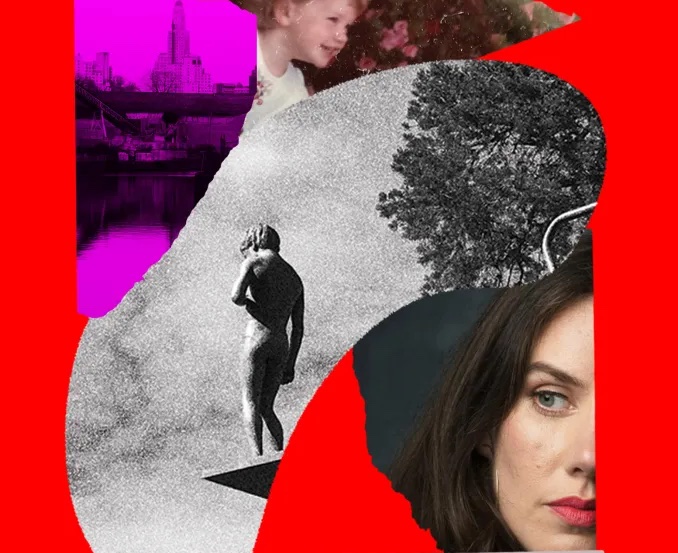Interviews
Leigh Stein on Abuse, Grief & Enchantment
Stein talks about her new memoir and an abusive relationship

Leigh Stein’s memoir The Land of Enchantment (out August 2, from Plume), opens with Stein finding out that her ex-boyfriend Jason was killed in a motorcycle accident. What unfolds is a heartfelt examination of an abusive relationship. Stein met Jason in 2007 and the two moved to New Mexico, the so-called “land of enchantment,” soon after. Once in New Mexico, Stein struggled with depression while Jason turned violent and volatile. Her memoir is told in chapters that alternate between years (mostly 2007 and 2011, but going as far back as 1998 and as close to the present as 2014). It’s a book about how Stein is haunted by the memory of Jason, long after their relationship is over, but it’s also a book about mental health, sharing on the Internet, and what it means to love someone who is bad for you.
I met up with Stein over tea in SoHo. We talked about writing a memoir while young, LiveJournal, and sentimentality.
Michelle King: First off, how did this book start?
Leigh Stein: Well, back in 2012, Mira Ptacin, who ran the Freerange Nonfiction series, asked me if I would read an essay for the series. I didn’t consider myself a nonfiction writer, but I wrote this essay that was about Jason’s death and my college classmate Julian, who I write about in the book, and read it at this nonfiction series at Pianos. The bar was so crowded and noisy that people were leaving and demanding their money back. I was the last reader of the night. It was deadly silent when I went, and then when I finished all these women came up to my crying. One young woman said her best friend had just died and she couldn’t stop looking at her Facebook page. She said I was the only person who could understand. That’s when I was like, “Is this essay a book?” I hadn’t considered it until that moment, when I got that response. That essay was the seed. For a year or maybe two years, I said I was writing a book about online grief. That’s what I thought I was writing a book about. Finally, I saw that my relationship with Jason was at the center of it.
King: How did that realization come to be?
Stein: I think it was just getting the feedback from workshop. In your mind, you’re like, I’m writing this, and then other people read it and they’re like, “Actually, you’re writing this other thing.”
King: The book bounces around in time. You open with Jason’s death. We go as early as 1998, when you’re 13, then we go as late as 2014. The majority of the book is 2011 and 2007. How did you decide on this non-linear structure?
Stein: I started writing in 2012. The 2011 stuff was still fresh enough that it seemed like that could be a framework. This is something I always talk about in my Catapult class. This question of “Why would you start by giving it all away?” It doesn’t matter if you learn right away that Jason died. I think in memoir, the reader isn’t dying to know what happened, but what does it mean and what are the implications of it happening.
King: You quote your diary a few different times in the book. I’d love to hear a bit about the self-research you had to do for this book, including reading diaries.

Stein: Memoirists get a lot of shit about how they’re making things up. I love how Mary Karr says that if something is very emotional, it sears in your memory. I remember the most dramatic moments of my life so vividly, but I might not remember what I had for breakfast last week, because it’s not important and it wasn’t emotional. But what I did for [this book] was I wrote everything from memory and then later I would go back and check or find more details. One interesting thing that happened is that, when I tell people what my book is about — if I say I was in an abusive relationship — they always ask “Was he physical?” And, to me, that isn’t the most important part, but to them it is. They want to know how bad it was. They want to imagine it. In the book, there are two times he was physical, times I remember. But when I was doing my research, I went back and read my LiveJournal — which I have since made hidden — and I found this whole scene of him slapping me in the face, and I don’t remember it at all. I have no memory of it, even though I can read the scene in my own writing. I thought, Do I put this in the book? When I don’t remember it? It was so weird. I didn’t put it in the book.
King: I think your book shows a different side of abusive relationships than we’re used to seeing in films and in TV or reading in books. I think people ask those kind of questions like “Well, was he physical” because feel like they need to declare if it was bad enough.
Stein: Yeah. Exactly.
King: But that’s so far from the point.
Stein: Right.
King: Early in the book, you ask what it means to miss someone like Jason, to have ever loved someone like Jason. Was that one of the questions you were trying to answers when you set out to write this book?
Stein: Yeah. Even I had an idea of what kind of women would be in a relationship like that. What kind of women would stay with someone like that, who treated her like that? That was that other kind of women. That wasn’t like me. I was so smart. The whole time, I thought, I’m so smart. I know exactly what’s going on. I know how to get out of it when I want to. I love him. I’m in control. In hindsight, it’s so clear to me that it was a kind of addiction. I was willing to sacrifice anything to have those flashes of high. I’ve never had that with anyone else. I thought that’s what love was. I hope a lot of women see themselves in my story and realize they don’t have to be ashamed.
In hindsight, it’s so clear to me that it was a kind of addiction…I thought that’s what love was.
When I started writing the book, I thought, I am writing a story that never happened to anyone else, because I am so special and Jason was so special. By the time I finished it, I realized it was the story of so many women. I don’t think I’m alone in this, even though I started off feeling I was alone.
King: I was reading your New York Times piece about being a young memoirist. You mention that, to people who criticize your age, it wouldn’t occur to them that maybe you specifically want your early-30s perspective on what happened. I’m curious about why it was it so important for you to write this book now, with this perspective.
Stein: There’s something about just confessing honestly and having the reader be like, “Me, too!” without the wisdom of some future version of the writer being like, “Well, what I wish I’d known…” I just didn’t want that in this memoir. When I was finishing the book, I was working on the final pages and was like, “Oh my god. Do I have to get married?” Like, what’s an arc for a young woman in a book? You get married and you have a baby. There’s this trajectory, and I was like, well, what if I can just have this defining experience and come out of it and not replace him with another man or fulfill myself by having a child?
King: That’s still an arc! Probably because I’m young, but I never even think to criticize someone on their age. Like, you can still write about this topic when you’re older…
Stein: Well, that’s the joke among memoirist, right? You can write the same book every 10 years.
King: Right, right. Something that was super unique to me about this book was the role the Internet played in grief. It’s something I haven’t really seen written about in grief memoirs. Can you talk about your process in writing about the internet and its link to grief?
Stein: I grew up on the internet. I’ve been online since I was like 10 years old. It’s just where I live. I don’t like this false duality that there’s internet and then there’s real life. There internet is my real life. It’s where I spend my time, it’s where I talk to my friends, it’s where I make friends. I don’t read a lot about that. I feel like we need more books about the internet — about falling in love online, about making friends online, about breaking up online.
King: I think your book might be the first literary mention of LiveJournal —
Stein: [Laughs] I love LiveJournal! LiveJournal is this little clique. When I say it, other women in the room will light up and be like, “LiveJournal? We’re talking about LiveJournal?” You didn’t know who anybody really was. It was this special time.
King: Totally. I was such a LiveJournal freak. I described LiveJournal recently as the wild west of the internet. Like, there were no rules.
Stein: Yes! You had to follow the right people to find the cool, other people to follow. You could make it private. Your mom and dad weren’t on there. Your aunt wasn’t awkwardly commenting on things. It was a place for young people.
King: Yeah, absolutely. And then it just kind of died…
Stein: Yeah. I think at some point I switched to Blogspot to be more mature. [Laughs] Be more professional at, like, 20. Maybe I just sensed LiveJournal was dying.
King: I had a writing teacher once say to me, “Beware of sentimentality” and now I have that hanging above my desk. Something that impressed me about the book is that it’s such an emotional topic but it doesn’t veer into sentimental or mawkish territory. Is that something that comes naturally to you?
Stein: I like the advice, “The hotter the emotion, the cooler the prose.” And, yeah, I do think that comes really natural to me. The more I can keep it to the facts, the more I’m letting the reader bring their emotion, rather than telling them what to feel. But I also always hear Jason’s voice, that I make a big deal out of everything. He’s still in the back of my head.
“The hotter the emotion, the cooler the prose.”
King: So, when you were writing this book, you heard his voice in the back of your head?
Stein: Yeah. And I still do now. I’m such a different person than I was when I was with him. I feel so much stronger and more independent and more clear on who I am, but when I get challenged about my story, it’s just like he’s saying it to me. It’s like he’s back. I can hear him saying, “Why did you write a book about this? I can’t believe you wrote a whole book about this. Why do you always play the victim?” But, at the same time, he was very proud of me and my writing career. He was one of the first people to take me seriously as a writer.
King: That’s invaluable, especially before you’ve published anything.
Stein: Right. It’s very confusing to be in a situation where he’s your one champion and your worst critic.
King: Was it important to you when writing the book to show those good times?
Stein: That was extremely important to me. I don’t think he’s the villain and I’m the good girl. I really resisted writing that narrative.
King: Let’s talk a bit about the title of the book. The Land of Enchantment is a nickname for New Mexico, but it definitely seems like there’s a second meaning going on.
Stein: Yeah. I definitely think it’s a metaphor for our relationship. My relationship with Jason was like an an isolated kingdom and Jason and I were the only people who understood it. When he died, I was left alone with that. When he was alive, the people on the perimeter — my family and my friends — I always had to figure out what I told them, what I didn’t tell them. I couldn’t explain how good it was sometimes. I never told them the worst. Nobody else could see it from the inside. They couldn’t get in the walls of the kingdom.
King: On your Tumblr, you wrote about considering getting a tattoo after Jason died and then you write, “Ultimately I didn’t get a tattoo. I’m writing a book instead.” How did writing a book serve the same purpose?
Stein: I had that in the book at first and then a teacher was like, “Yeah, you can’t write about being a writer. You have to cut that out.” I really wanted a tattoo after Jason died. It just felt like, this was a foundational experience in my life, that not many people knew about me. Then I felt like I had to be able to write the book to talk about it.
King: Did writing this book give you a different outlook on the relationship
Stein: Yes. I hadn’t connected all the dots. When I started writing, if you had said, “Was it an abusive relationship?” I would have been like, “No. It was complicated.” But I read the proof of the book — I mean, I read the book in full — and I was like, “Oh, it all makes sense now.” I finally put it together for myself.









